Science
Hidden Passageways on Mars and the Moon: Will They House Future Bases?
03 March 2026
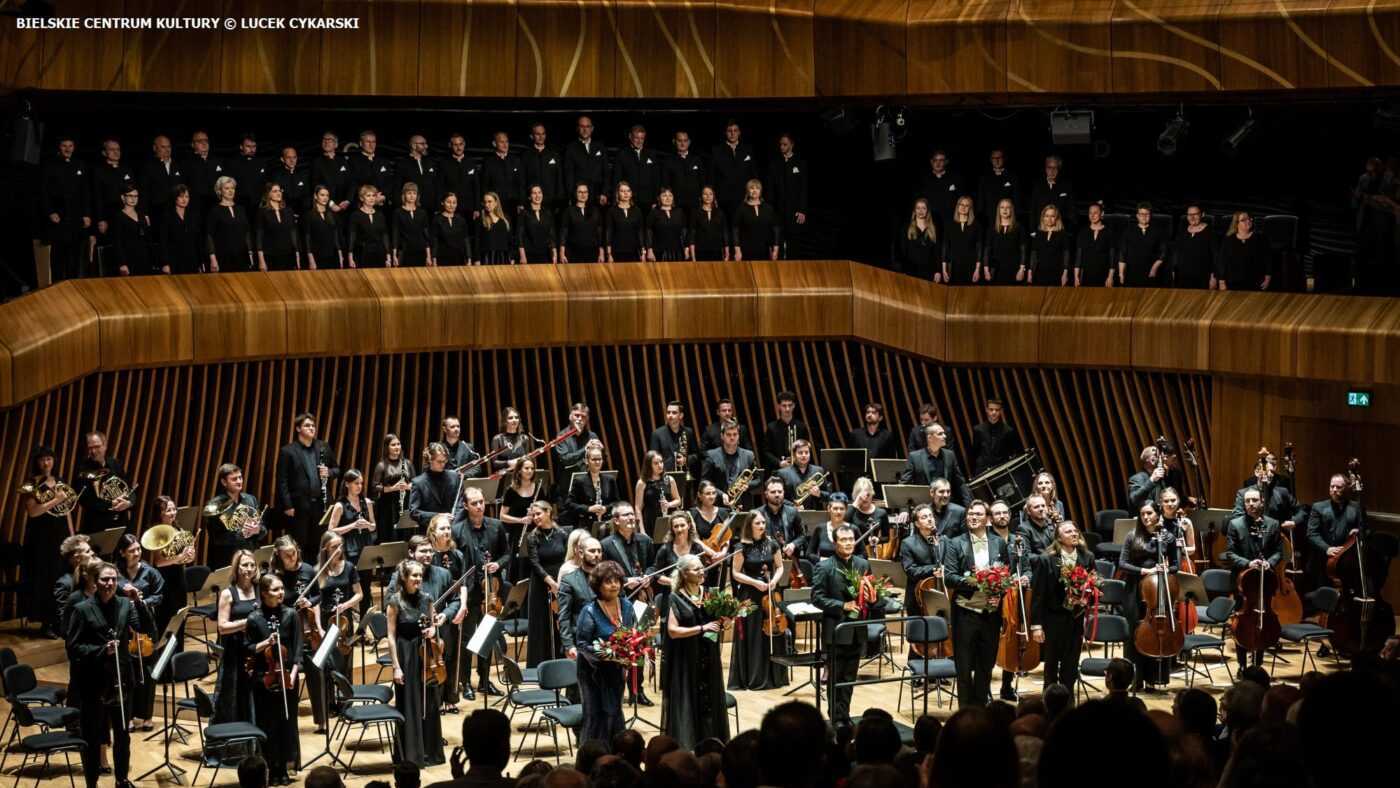
This September, the Cavatina Philharmonic Orchestra will give its debut performance in Bielsko-Biała. It is an unprecedented project in Poland’s music scene – a fully private, professional philharmonic orchestra. We discuss the ideas, challenges and opportunities with its founders: Michał Dziuda, benefactor and driving force behind the Fiducia Foundation; Andrzej Kucybała, artist, manager and renowned conductor; and Jacek Stolarczyk and Jacek Obstarczyk, the project’s artistic directors.
Wojciech Wybranowski: In September, the Cavatina Philharmonic Orchestra will debut with a special concert in Bielsko-Biała. Stanley Dodds, associated with the Berliner Philharmoniker for over 30 years and currently the principal conductor of the Sinfonie Orchester Berlin, has been appointed as its artistic director. The project of a private, professional symphony orchestra, implemented by the Fiducia Foundation, is quite original and innovative in Poland. Where did this idea come from?
Michał Dziuda: Andrzej Kucybała is the guiding spirit behind the idea of creating the orchestra. He’s a man with an impressive artistic background, engaged in the music world not only in Bielsko-Biała but also internationally. He has always wanted Bielsko-Biała to have a professional, full-time orchestra and has consistently worked towards this goal.
Andrzej Kucybała: I’m honored to participate in such a wonderful project. I’m glad you’ve noticed my desire to build something in Bielsko-Biała that will not just be an occasional cultural phenomenon but will last forever. I’m grateful that fate brought us together. Throughout my life, wherever I’ve worked – Stalowa Wola, Tarnobrzeg, and now Bielsko-Biała – I’ve always met people with whom we’ve created something extraordinary that has gone down in music history. For instance, in Stalowa Wola, we managed to create the “Young Musicians for a Young City” festival, or later in Baranów Sandomierski – the “Musical Meetings”. We started organizing these during the difficult communist era, and despite the challenges, we managed to invite people who had a great influence on shaping Polish culture.
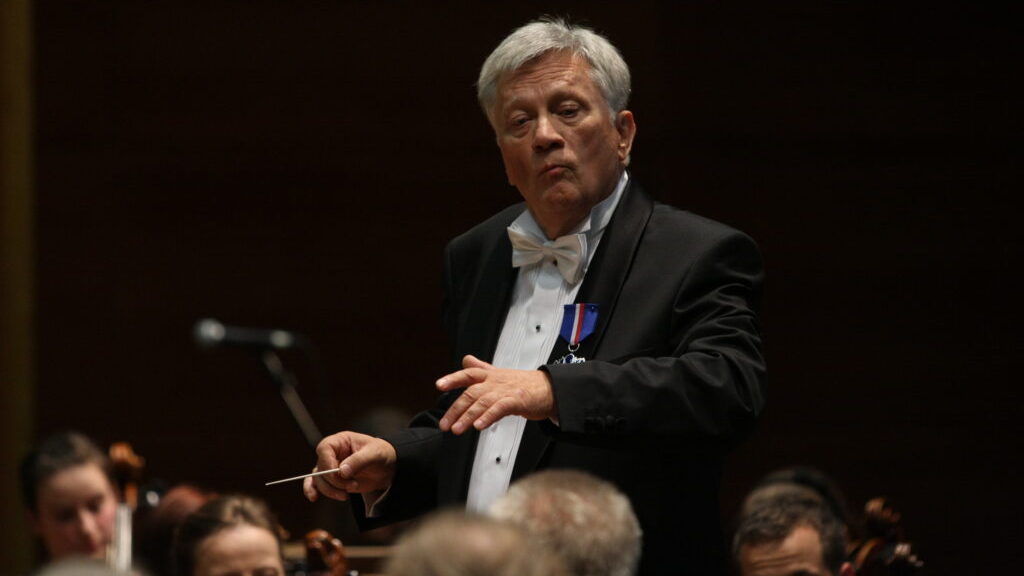
But returning to the idea of the orchestra in Bielsko-Biała – throughout my time in this city, I’ve persistently strived for the creation of a professional orchestra here. We tried already in the 1980s – together with the late Tadeusz Kocyba (composer of music for animated films) – to create a semblance of a symphony orchestra, namely the Bielsko Chamber Orchestra. Initially, we managed to secure funding for this project, but unfortunately later, when Bielsko lost its status as a provincial capital, everything fell apart. And while the orchestra still nominally existed, it ceased to be an ensemble that carried out its projects.
Jacek Obstarczyk: For many years, there’s been talk in Bielsko-Biała about the need to create a good symphony orchestra. Why? Our city hosts many concerts, various festivals, and broadly understood musical events in which such an orchestra should naturally participate. The issue is that until now, only the aforementioned Bielsko Chamber Orchestra operated here, sometimes also appearing under the name of the Bielsko Festival Orchestra, which wasn’t a full-time, professional orchestra, but a project-based one. This means that when an event was organized in the city where an orchestra could perform, they simply gathered a group of people who normally work in other musical ensembles to play together for one concert or to perform at a given cultural event.
And later these artists went their separate ways…
Jacek Obstarczyk: Yes. There has never been a proper orchestra in Bielsko-Biała before. Of course, various ideas emerged, people with visions of what such an orchestra could look like, but finalizing such intentions was very difficult. You must realize that establishing a symphony orchestra is not easy to accomplish; firstly, you need extensive knowledge on how to do it, and secondly, you need significant financial resources to make it happen. That’s why, despite the expectations of Bielsko’s music lovers, it took a long time to create an orchestra.
The breakthrough event was the creation of the Cavatina Hall concert venue. Even as it was being built, the idea emerged that it should have a permanent professional orchestra, and we took advantage of this opportunity. The orchestra is being formed, it will give its first performance in a few months, and it will be an absolutely historic moment.
The idea that Bielsko-Biała should have its own professional symphony orchestra was discussed even when I was a child, and later when I was studying at the University of Music. But no one knew how to do it or had the means. Years passed, and now the Cavatina Philharmonic Orchestra is being created.
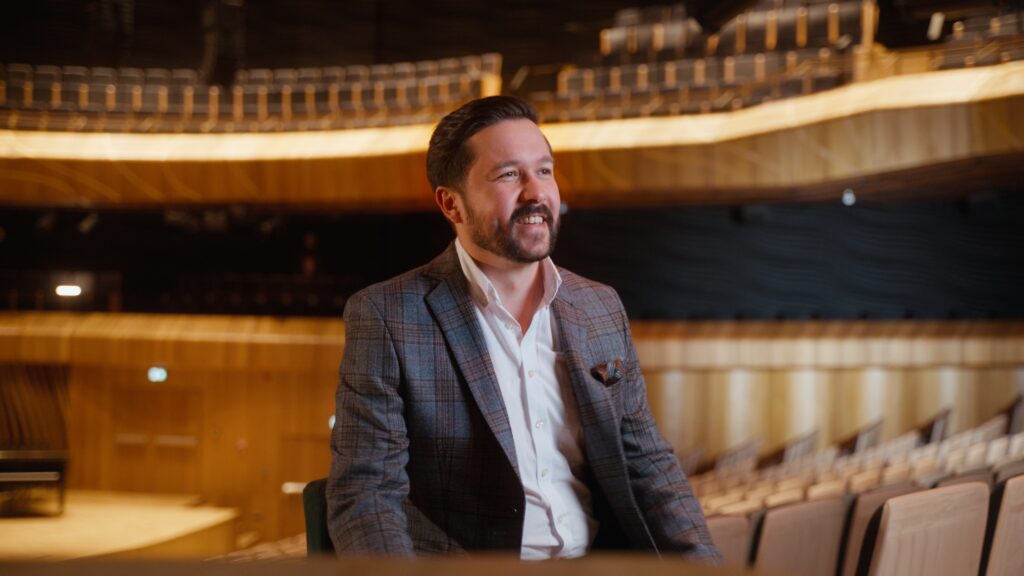
Michał Dziuda: Andrzej, you mentioned the 1980s. In your opinion, how does the freedom during the communist period differ from the freedom we have today, of course, considering the artistic spirit and the ability to create music? Clearly, we can’t compare the communist system to the one we have now, as democracy is incomparable to any system, especially a totalitarian one, which was de facto a prison. However, in every system, certain hidden spheres of influence are formed. And today, I feel, we are also somewhat imprisoned when it comes to the arrangements existing in the music world in Poland.
Andrzej Kucybała: In the period of deep communism, even the communists recognized the importance of culture, which the authorities of the time didn’t particularly interfere with. They considered it a field that brought them some honor, something they could boast about, so for example, they supported and promoted Penderecki’s work. It was a kind of niche in that prison that they turned a blind eye to.
Michał Dziuda: They didn’t feel threatened. And like all leaders of totalitarian regimes, they had their place where they could show themselves to the world with the message: ‘Look, we are normal after all.’
So they refrained from strongly interfering with high culture, with music, because it was supposed to be an illusion of freedom?
Andrzej Kucybała: Yes. They were giving people a semblance of a certain freedom, but at the same time, it was strictly controlled. I’ll give you my own example. I once founded a school choir and decided that we would practice and improve on Bach’s works. When the party authorities found out that we were singing Bach, which is church music, I was called on the carpet to the PZPR City Committee and had to explain myself profusely. I won with a simple answer (laughs).
The First Secretary of the PZPR Provincial Committee was sitting sprawled behind his desk, drinking coffee. I say to him, “Are you drinking coffee?” – “Yes,” he replies. “You see, and we’re singing about coffee,” I say. The guy reacts with surprise, wondering how that could be. “Yes, Bach wrote a cantata about the liquid you’re drinking,” I explain. And there was no more censorship after that, we could sing Bach.
Let’s return to the issue of today’s enslavement of young artists by certain patterns imposed by schools or musical environments. I would say that it really all depends on the individual. If you have your own strong personality and believe in yourself and your talent, you won’t let yourself be broken. No system will break you; you’ll do what you consider important for yourself and others.
We recommend: Delight and Outrage: The Emotive Power of Art
Michał Dziuda: However, orchestra performances are a team game. So why isn’t any philharmonic ensemble from Poland more widely known abroad today?
Andrzej Kucybała: It mainly results from the work system, an inefficient system that enslaves musicians, causing the artistic level to plummet. In short: the system is based on the artist coming at a specific time, performing a specific quota, and you’re evaluated based on this quota. Today, we’re at the same level of work culture for Polish philharmonic musicians as it was during the communist period, 40 years ago; absolutely nothing has changed in this respect. There’s been an ongoing debate for years about what the profession of an artist essentially is, but unfortunately, no one has the courage to make decisions and define “who is an artist.”
Michał Dziuda: We want to take a different path. Do you think we have a chance with our orchestra to be a pioneer in the Polish market, starting a completely different era?
Andrzej Kucybała: The project we want to implement is absolutely innovative in Polish conditions.
And here we return to the Cavatina Philharmonic Orchestra. In one of the music magazines, I read that there’s also a Bielska Orkiestra Cavatina operating in Bielsko-Biała. Is the new project a continuation of its activities?
Jacek Stolarczyk: That was the first approach to the idea of creating a Bielsko orchestra by the city authorities and the Fiducia Foundation. The orchestra was project-based, regularly giving a chamber or symphonic concert once a month at Cavatina Hall. We wanted to check if we would be able to implement such a project and, of course, if there was interest among Bielsko’s music lovers. Now we can say that the project has evolved, developing into the idea we’re currently implementing, which is the Cavatina Philharmonic Orchestra.

Throughout the 1990s, there was talk that Bielsko-Biała must have a professional, philharmonic orchestra. But it ended with just talk.
Andrzej Kucybała: There’s one general reason why it couldn’t be done then: there was no place where the orchestra could be located. The Music School Hall in Bielsko-Biała, very beautiful and acoustically good, is a hall for only 350 seats and is the concert hall of the Bielsko music school. The situation decidedly changed with the creation of Cavatina Hall…
Michał Dziuda: Cavatina provides not only hardware. Cavatina Hall also provides software, which is the organizational approach. And these two factors are key to achieving the high level we’re talking about.
Fortunately, the city authorities are cooperating with us, they’ve declared help, but I won’t hide that Cavatina covers financially most of the orchestra’s budget. And here the question arises, whether and how we can change this. We should find people in Poland who will be fascinated by our idea for the orchestra, how it will play, how it will work, its sound, and as a result, decide to support it as well. I would very much like to find people who will say: “You’re creating something so innovative, so amazing, something so artistically moving that I will support you.”
Of course, we won’t cooperate with anyone who will set us conditions like: “I’ll give you a million zlotys, but you must employ Mr. or Mrs. XY.” We will never agree to such arrangements. However, it would be nice to feel broad support, after all, Poland has 40 million people, and many of them are wealthy.
Andrzej Kucybała: It will be easier for us after we start operating; when the truly outstanding artists we’re employing present themselves; when we give our first concerts. We’ll slowly start reaching people who have money and want to invest it in culture, just as you do. There’s hope, and I believe we’ll manage to achieve this.
We recommend: Life as an Artist in Poland Is Not an Ordeal
Could you please reveal what repertoire you have planned for the Orchestra’s September debut? Unless it’s meant to be a surprise to astonish music lovers.
Jacek Obstarczyk: Stanley Dodds – our artistic director – has focused on classical symphonic works for the first season, primarily Beethoven and Mozart, on which the orchestra will, in short, “gel together”. In addition, there will be film music and concerts for children, as well as educational activities, not only for young listeners. Moreover, Stanley’s fascination with Polish music will be evident in the repertoire with works by Grażyna Bacewicz, Witold Lutosławski, and Kazimierz Serocki.
From the project assumptions I had the opportunity to learn about, it appears that the Cavatina Philharmonic Orchestra will differ from those already functioning in Europe.
Michał Dziuda: On one hand, this difference will lie in the artistic layer, including the selection of repertoire and the way music is presented. But there are also fundamental differences in the organizational dimension: in the way, artists are recruited and how they function within the ensemble.
Jacek Obstarczyk: Yes, if we take our orchestra and compare it with any of those already functioning, we must also remember that these are usually orchestras with very long traditions. On one hand, this is beautiful because we can talk about the distinctive style of a given orchestra; the “Viennese” have certain tonal nuances, while the “Berliners” have others, and that’s why performances of the same pieces sound completely different, etc. These are issues that stem from certain performance traditions.
Michał Dziuda: The sound can result from interpretation, but it also stems from the ensemble’s arrangement, the instruments they play, and how the conductor leads the orchestra.
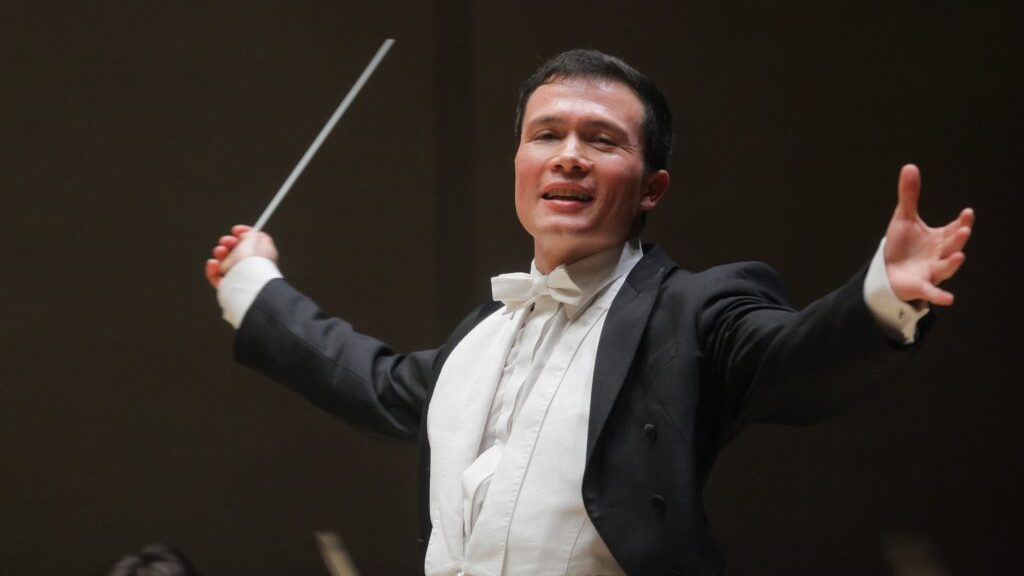
Jacek Obstarczyk: Of course. The conductor and their interpretation. The conductors who have worked with these orchestras over the years have shaped their way of performing pieces, and their approach to them. And that’s the first thing. Second – over the years, certain performance mannerisms have developed that are characteristic of individual ensembles, and finally – the instruments they play. Take wind instruments, for example, which were the last to develop, and the last to evolve in terms of construction. The French went in one direction, and the Germans in a completely different one, and differences appear between these orchestras, also in the construction of the instrument itself.
Michał Dziuda: This is more a topic for musicological analysis than for our conversation. But you started by saying that the sounds of different orchestras result from tradition, and we’re just beginning to create this tradition. What does this mean for us?
Jacek Stolarczyk: Our tradition is only just forming and shaping us. We also don’t fully know in which direction we will strive as an orchestra, and what we will specialize in. The “Viennese”, for example, absolutely don’t touch contemporary or popular music, and these are ideas we’re considering. We would like to reach not only for classical music but also to realize symphonic projects, for example, in collaboration with rock bands.
We will be an ensemble that works in the same permanent lineup, which gives us an advantage over orchestras where the ensemble constantly rotates. Why? Because an orchestra where the ensemble changes depending on the project it’s participating in practically has no chance of entering the Super League. If you’re working on several projects, and some other orchestral ensemble is the first choice, there might be a lack of commitment, or simply a “sorry, but I can’t make it this time” situation.
We recommend: The Magic of Biography. Why Are We Fascinated by Other People’s Lives?
We talked about the harsh communist period. Was there an orchestra in Poland during the interwar period that could be said to have played at an international level?
Andrzej Kucybała: There were two highly regarded orchestras in interwar Poland: the Lviv Philharmonic Symphony Orchestra and the National Philharmonic in Warsaw. From old stories of my acquaintances who lived in Lviv at that time, the Lviv Philharmonic also performed abroad, and one thing was characteristic of it. It was the only orchestra in Poland that had Stradivarius violins and instruments from other famous Italian luthiers in its collection.
Michał Dziuda: We’d like to have those too (laughs). For now, we have assurance that we’ll receive one very interesting instrument…
Andrzej Kucybała: I hope we’ll acquire an Amati violin from 1710, which is in the possession of an outstanding Polish violinist. There’s a chance because its owner is striving to keep it in Poland rather than let it go abroad.
Michał Dziuda: We’re also employing an eminent expert on wind instruments from Berlin.
Andrzej Kucybała: This person is one of the most famous oboists in the current music world. It’s very beneficial for us because it will inherently raise the level of musicians who compete in our auditions. It will elevate the prestige and simultaneously make them understand that there can be no shoddy work here.
You want to be at the forefront of world music in the orchestra category. That won’t be an easy task.
Michał Dziuda: The Super League is about the ensemble playing together for a long time, the conductor working with the orchestra to develop its characteristic sound, plus the repertoire, which in our case will be quite “off to the side,” different from what other philharmonics in Poland present. We’ll be more open to various trends in modern, and contemporary music, and once the orchestra’s sound is developed, it will occupy a certain place in the musical space. Of course, we don’t know yet, it’s hard to assess today what point we’ll reach, but I wonder if what we’re talking about gives us an advantage over other orchestras or if it’s more of an experiment…
Jacek Obstarczyk: There’s a great openness to try different things and different styles, and this initial period will give us answers to the questions we’re asking ourselves today. We’ll know which direction to go, where to “push”…
So, to look for a direction that will allow the orchestra to develop a certain recognizability?
Michał Dziuda: That’s why in the first step we’re choosing classical repertoire – of course, there will be other pieces too – but this classical repertoire will serve to go through a certain workshop, to refine the orchestra’s sound. The first year is dedicated to allowing the orchestra to gel, to develop its characteristic style.
Jacek Obstarczyk: Stanley Dodds’ observations are interesting. He pointed out that there’s no orchestra in Poland that’s talked about in the West as having its own characteristic, recognizable style. There’s nothing like that. However, we can work on it from the beginning, we have a “clean slate.”
Michał Dziuda: We want to join the World League. Together with Stanley, we have the intention to develop our own style that will make us known as “that orchestra from Bielsko-Biała has its own sound and it’s at a world-class level.” Those are our ambitions.
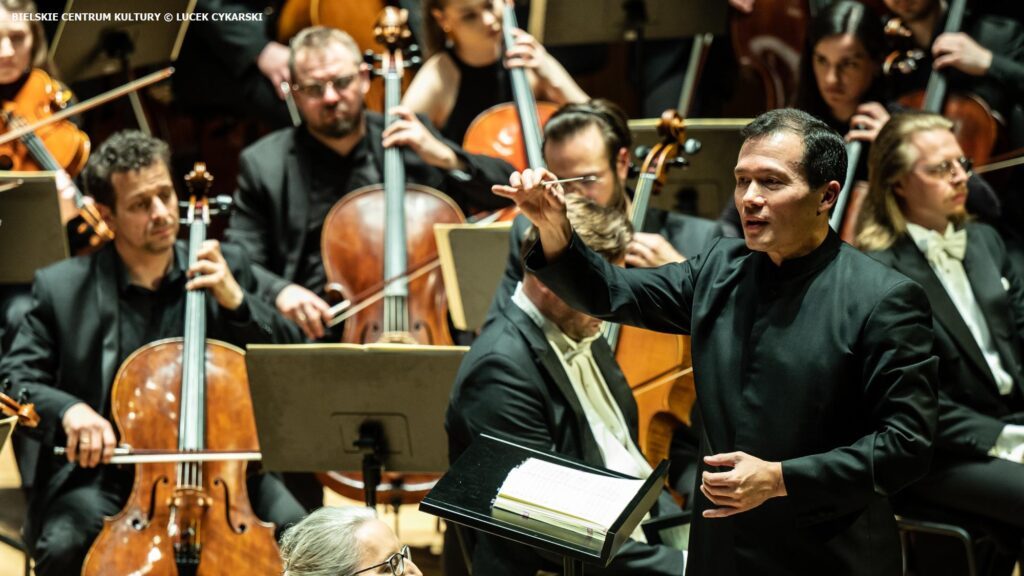
Jacek Obstarczyk: This will certainly be a long-term process. When talking about music, you can use many analogies to sports. You can’t build a new physique, and muscles, lose weight, and build form in a short time; similarly, music requires time. Music matures, there’s no shortcut. We’ll have many answers after a year or two.
Jacek Stolarczyk: Much depends on what musicians we manage to invite to collaborate. After a year or two, we’ll know which direction we want to go. Today we have many ideas, we’ll be testing them. This is also very important in recruitment because we want people who are open to new challenges and ideas. In conservative orchestras, sometimes it happens that a musician can play Beethoven, Strauss, and nothing more. Full stop, they won’t develop. We don’t want such people.
Translation: Klaudia Tarasiewicz
Polish version: O Cavatina Philharmonic Orchestra z Bielska-Białej będzie głośno (część 1)